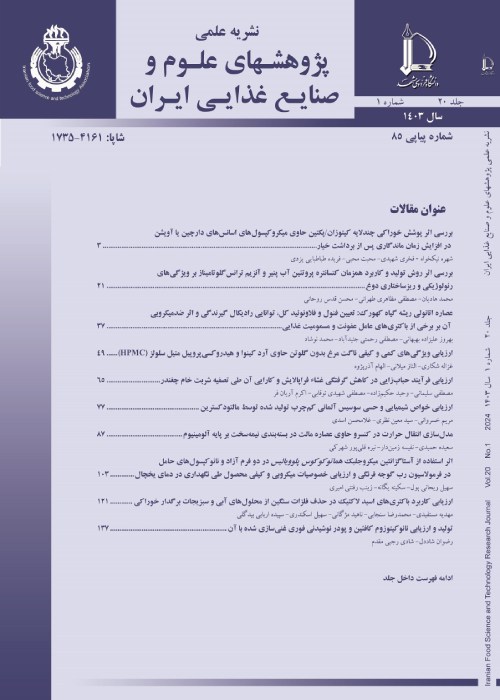Measuring some characteristics of raw and degummed Moringa seeds and comparing their stabilities
Author(s):
Abstract:
Introduction
Moringa is a tree that grows in hot and humid regions and produces oil seeds that contain about 33% edible oil. The tree is native to the south-west regions of Asia and it is cultivated in Hormozgan and in Sistan and Bluchestan provinces of Iran. The oil extracted from these seeds is edible and has some various industrial applications. The extracted oil usually contains considerable amount of dissolved impurities which must be removed prior to industrial usages. Major part of impurities is removed by settling or filtering process. The fine impurities are removed through a degumming process using water, acids or enzymes. The degumming process affects the physco-chemical characteristics of the oil. In this research, various physco-chemical and heating properties of Moringa oil was measured and the stability of the oil under elevated temperatures were investigatedMaterial and
Methods
The Moringa seeds were collected from the wild trees that grow in Hormazgan province. The seeds were manually cleaned and ground to mean diameter of less than 1 mm and then were placed in an oven at 65°C for 24 h to reduce their moisture. Samples of 50 g ground seeds were placed insoxhelt and n-hexane was used as the solvent. The oil extraction experiments were conducted at 60°C for 7 h retention time. The raw obtained oil was divided into two parts and one part was degummed. The degumming of the oil was performed by adding distilled water to it and raising the temperature to 80°C. Then, phosphoric acid was added to the mixture and stirred for 20 min at the same temperature and the mixture was centrifuged and the oil was separated from water and wax. Some characteristics of the raw and the degummed oils including: fatty acids, ion value, peroxide value, chemical, color, saponification value, ignition and clouding points, density and viscosity were measured and compared. The stabilities of the viscosity of the two oils were investigated under different temperatures ranging from 3 to 120°C. The oxidative stability of oils was determined against temperature, light and air exposure. In these experiments temperature ranged from 20 to 120°C, light and air exposure time were 10 days, each. High temperature stability of the oils was also verified using a Rancimat instrument.Results And Discussion
The results of fatty acids analysis indicated that the Moringa oil is generally unsaturated oil containing a total of 76% pulmonic and oleic acids. The major saturated oil content of Moringa oil was plasmatic acids which accounted for 14.3% of the total fatty acids. High amount of unsaturated acids indicates that this oil is good for cooking purposes. The degumming process caused a significant decrease in peroxide value, saponification number and total fatty acids but the viscosity and the pH of the oil increased which all indicates that the degummed oil should be more stable than the raw oil. All heating properties of the degummed oil such as melting, combustion, pour, and cloudy points of the degummed oil increased which indicates that the degummed oil is more suitable for heating foods. In investigating the stability of the oil, the viscosity of the Moringa oil was decreased as the temperature of the oil was increased however, the viscosity increased with the holding time. The increase of the viscosity was more significant at higher temperatures due to the oxidation and degradation of the oil. Generally, increase in the viscosity of the degummed oil occurred at with lower rates. The peroxide value of the raw and the degummed oil was increased as the temperature of them was increased. The increase had higher rates when temperature of the oil exceeded 60C. The peroxide value was also increased with the holding time. The change was not significant for the first four days but it rapidly increased after that. The peroxide value of the oil that kept away from the sunlight remained unchanged for the 10 days test period. The value of peroxide was also affected by aerating the oil. Degradation was initiated immediately as aeration was started but a steep increase was noticed after the second day. The highest peak was reached on the sixth days and after that the oil was completely degraded. A Racncimat test on the raw and degummed oil indicated that with increase in the oil temperature the stability of the oil decreased and when temperature was at 110°C the stability of the raw and the degummed oils were 19 and 31 hours. In general, all the tests indicted that the degummed Moringa oil had higher stability than the raw oil.Keywords:
Language:
Persian
Published:
Iranian Food Science and Technology Research Journal, Volume:13 Issue: 2, 2017
Pages:
405 to 414
magiran.com/p1693832
دانلود و مطالعه متن این مقاله با یکی از روشهای زیر امکان پذیر است:
اشتراک شخصی
با عضویت و پرداخت آنلاین حق اشتراک یکساله به مبلغ 1,390,000ريال میتوانید 70 عنوان مطلب دانلود کنید!
اشتراک سازمانی
به کتابخانه دانشگاه یا محل کار خود پیشنهاد کنید تا اشتراک سازمانی این پایگاه را برای دسترسی نامحدود همه کاربران به متن مطالب تهیه نمایند!
توجه!
- حق عضویت دریافتی صرف حمایت از نشریات عضو و نگهداری، تکمیل و توسعه مگیران میشود.
- پرداخت حق اشتراک و دانلود مقالات اجازه بازنشر آن در سایر رسانههای چاپی و دیجیتال را به کاربر نمیدهد.
In order to view content subscription is required
Personal subscription
Subscribe magiran.com for 70 € euros via PayPal and download 70 articles during a year.
Organization subscription
Please contact us to subscribe your university or library for unlimited access!


